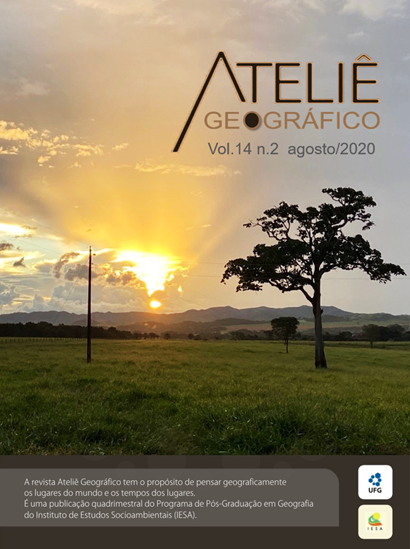Wari': conversion, cultural identity and territorial markers in the Terra Indígena Igarapé Laje in Rondônia State
DOI:
https://doi.org/10.5216/ag.v14i1.58456Abstract
The present article analyzes evangelical conversion performed by the New Tribes Missions of Brazil – MNTB at the Laje Velho Village, which have, for about fifty years, dedicated themselves to convert the Wari' indigenous people to Christianity. Taking into account the Wari’ symbolic contribution to nature, including it’s cultural identity, their ancestral experiences and cosmogony; we relate it to the structural and structuring territorial markers, so as to identify and distinguish which actions are considered as originating in the collectivity and which actions are characteristic of the involving society. The article is the result of fieldwork and interviews conducted with the Wari’ people in the Terra Indígena Igarapé Laje, located between the municipalities of Guajará-Mirim and Nova Mamoré in Rondônia State. It presents the perceptions and respective analyses based on methodological approaches built through bibliographic references, in which phenomenology is the main theoretical basis for analyzing the problem.
KEYWORDS: Evangelical Conversion. Cultural identity. Territorial Markers. Wari’
Downloads
Downloads
Published
How to Cite
Issue
Section
License
Autores que publicam nesta revista concordam com os seguintes termos:- Autores mantém os direitos autorais e concedem à revista o direito de primeira publicação, com o trabalho simultaneamente licenciado sob a Licença Creative Commons Attribution que permite o compartilhamento do trabalho com reconhecimento da autoria e publicação inicial nesta revista.
- Os autores não serão remunerados pela publicação de trabalhos na Revista Ateliê Geográfico. Além disso, os conteúdos publicados são de inteira e exclusiva responsabilidade de seus autores, ainda que reservado aos editores o direito de proceder a ajustes textuais e de adequação às normas da publicação.
- Autores têm permissão e são estimulados a divulgar seu trabalho online (ex.: em repositórios institucionais ou na sua página pessoal), já que isso pode gerar alterações produtivas, bem como aumentar o impacto e a citação do trabalho publicado (Veja O Efeito do Acesso Livre).


